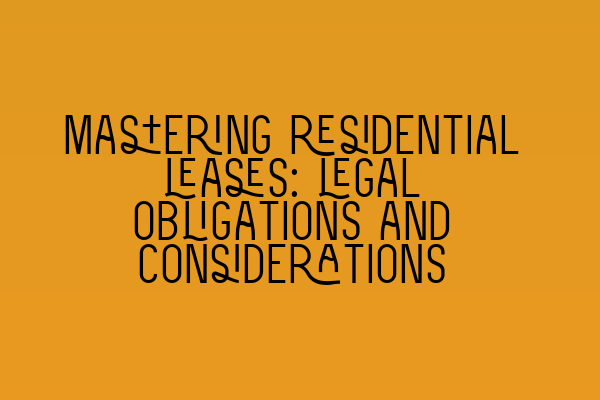Mastering Residential Leases: Legal Obligations and Considerations
Residential leases are an essential aspect of property law that landlords, tenants, and property professionals need to understand. Whether you are a homeowner looking to rent out your property or a tenant searching for a place to call home, having a solid understanding of residential leases is crucial. In this blog post, we will dive into the legal obligations and considerations associated with residential leases, providing you with the knowledge you need to navigate this complex area of law.
1. Introduction to Residential Leases
A residential lease is a legally binding contract between a landlord and a tenant that outlines the terms and conditions of renting a property. It grants the tenant the right to possess and use the property for a specific period, subject to compliance with the lease terms.
2. Essential Components of a Residential Lease
To ensure clarity and avoid future disputes, a residential lease should include the following essential components:
a) Names and contact information of the landlord and tenant(s)
b) Property description, including the address and any specific features
c) Duration of the lease, whether it is a fixed-term or periodic tenancy
d) Rent amount and payment details, including the frequency and method of payment
e) Deposit amount and information on how it will be protected
f) Maintenance responsibilities and obligations of both parties
g) Rules and regulations regarding pets, smoking, alterations, and other restrictions
h) Termination clause outlining the conditions under which the lease can be terminated
i) Dispute resolution mechanism, such as arbitration or mediation
j) Any additional terms or special provisions agreed upon by both parties
3. Landlord’s Legal Obligations
Landlords have certain legal obligations that must be fulfilled throughout the tenancy. These obligations include:
a) Providing a safe and habitable property for the tenants
b) Maintaining the property’s structure and ensuring it complies with health and safety regulations
c) Dealing with repairs promptly and efficiently
d) Protecting the tenant’s deposit in a government-approved tenancy deposit scheme
e) Providing the tenant with a copy of the Energy Performance Certificate (EPC) and gas safety certificates
f) Respecting the tenant’s right to privacy and giving proper notice before entering the property
g) Complying with anti-discrimination laws and treating tenants fairly and equally
4. Tenant’s Legal Obligations
Tenants also have certain legal obligations they must adhere to during the tenancy. These obligations include:
a) Paying rent on time and in full
b) Taking care of the property and keeping it clean and free from damage
c) Informing the landlord promptly about any repairs or maintenance issues
d) Complying with any rules and regulations outlined in the lease agreement
e) Allowing the landlord access for necessary inspections and repairs
f) Not causing a nuisance to neighbors or engaging in illegal activities on the premises
g) Giving proper notice when intending to vacate the property
5. Additional Considerations
In addition to the legal obligations, there are several other considerations that landlords and tenants should keep in mind:
a) Insurance: Landlords should consider obtaining landlord insurance to protect their property and cover any potential damages or liabilities. Tenants are also encouraged to obtain renter’s insurance to protect their personal belongings.
b) Rent Increases: Landlords must follow proper procedures and provide adequate notice if they wish to increase the rent during a tenancy. Tenants should be aware of their rights in such situations.
c) Subletting: Landlords should clearly state whether subletting is allowed or prohibited in the lease agreement. Tenants wanting to sublet should seek the landlord’s permission and ensure they comply with legal requirements.
d) Ending the Tenancy: Both landlords and tenants should understand the procedures and legal implications of ending a tenancy. It is essential to follow the correct notice periods and procedures to avoid any legal disputes.
6. Conclusion
Mastering residential leases is crucial for all parties involved in the rental process. By understanding the legal obligations and considerations associated with residential leases, landlords and tenants can navigate the complexities of property law with confidence.
If you are preparing for the SQE 1 or SQE 2 exams, we highly recommend checking out our related articles on SQE 1 Practice Exam Questions, SQE 1 Practice Mocks FLK1 FLK2, SQE 2 Preparation Courses, SQE 1 Preparation Courses, and SRA SQE Exam Dates.
At SQE Property Law & Land Law, we are here to help you succeed in your property law journey. Whether you need assistance with residential leases or any other aspect of property law, our team of solicitors are ready to provide expert advice and guidance. Contact us today to learn more about our services.
Disclaimer: The information in this blog post is for general informational purposes only and should not be considered as legal advice. For specific legal advice related to residential leases, please consult with a qualified solicitor.
